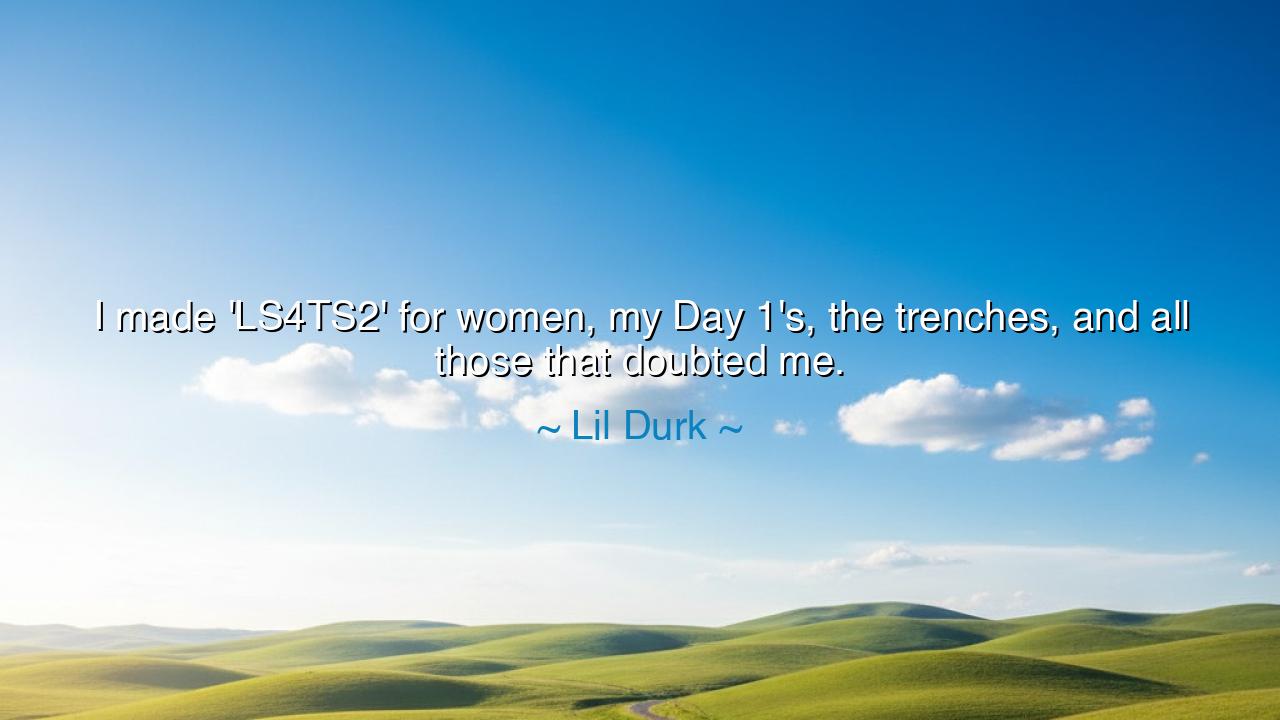
I made 'LS4TS2' for women, my Day 1's, the trenches, and all






The words of Lil Durk — “I made ‘LS4TS2’ for women, my Day 1’s, the trenches, and all those that doubted me.” — resound like the proclamation of a warrior who sings not only for himself but for the people who shaped him. His declaration binds together four pillars: women, who have carried, nurtured, and supported him; his Day 1’s, the loyal companions who stood with him from the beginning; the trenches, the hard places of struggle and survival; and finally, the doubters, whose disbelief became the fuel of his triumph. Each word is a tribute to the forces that forged his art.
The meaning of this statement lies in gratitude and defiance intertwined. Gratitude for those who walked with him in loyalty and love, and defiance against those who dismissed his vision. To dedicate a work of art like ‘LS4TS2’ is to immortalize not only himself but the community that gave him strength. It is a reminder that no artist, no leader, no fighter, stands alone — their story is braided together with the stories of others, of the faithful and the skeptical alike.
History bears witness to such acknowledgments. Consider Homer, who in the Iliad sang of warriors not only to glorify their deeds but to honor the bonds of loyalty that made their struggles possible. Or think of Nelson Mandela, who, upon his release, gave credit not solely to his own endurance, but to the comrades who shared his years of imprisonment and to the people in the trenches of apartheid who kept the fight alive. Just as Durk dedicates his work to his companions and challengers, so too do great figures of history point beyond themselves to the web of loyalty and struggle that gave them life.
The origin of these words is found in the soil of hip-hop itself, a culture born from pain, defiance, and resilience. The trenches symbolize the neighborhoods scarred by hardship yet rich with raw truth. To speak of “Day 1’s” is to honor the ancient code of loyalty, as old as brotherhood in battle. And to nod toward doubters is to remind the world that disbelief often becomes the sharpest spur to achievement. Thus, Lil Durk stands in a tradition as old as humanity — the poet-warrior whose art rises from the streets, giving voice to his people.
Therefore, O seekers of wisdom, let this teaching be remembered: greatness is not solitary. It is born of women who give strength, of friends who walk in loyalty, of trenches that teach endurance, and of adversaries whose doubt sharpens resolve. To create for them is to weave their lives into one’s own, to turn struggle into song and doubt into victory. Lil Durk’s words remind us that art is never only for the self — it is for the community that made the self possible.






ATle vo anh thu
This quote seems to highlight the emotional connection Lil Durk has with both the people who have supported him and those who doubted him. It’s almost like a tribute to both groups, with an undertone of proving his worth. Do you think that’s a healthy mindset to carry, using both praise and doubt as motivation? Or could this potentially be more of a reactionary stance?
KHNguyen Thi Khanh Huyen
The line feels like a celebration of defying expectations. ‘LS4TS2’ may be a product of both adversity and support, which makes it more personal. It’s a reminder that success is sometimes fueled by both positive and negative energy. Does this sound like a reminder to keep moving forward regardless of the opposition or is it more of a statement of validation for Lil Durk?
MHMinh Hai
It's interesting how Lil Durk ties his creation to both the loyal and the doubters. It’s almost like he's saying, 'I did this for all of you, the ones who stayed and the ones who didn’t believe.' Do you think this reflects a bigger cultural theme in hip hop—acknowledging struggles and proving people wrong? What’s your take on how this might influence his fans or listeners?
DKLuong Duc Kien
The idea of creating something for 'Day 1’s' and those who doubted you seems really powerful. It speaks to loyalty, not just from the people who supported you, but also from the people who questioned you. It almost feels like Lil Durk is flipping the script on those who doubted him. Do you think this kind of public acknowledgment motivates others to prove people wrong, too?
NANguyen Nguyen Anh
Lil Durk's message seems to reflect the journey of overcoming doubts and struggles, especially when you’ve got people who doubt your success. It’s a personal acknowledgment of loyalty, both from those who’ve been with him from the start and those who were skeptical. Do you think he's trying to send a message about the power of perseverance and loyalty, or is this more of a statement to silence his critics?